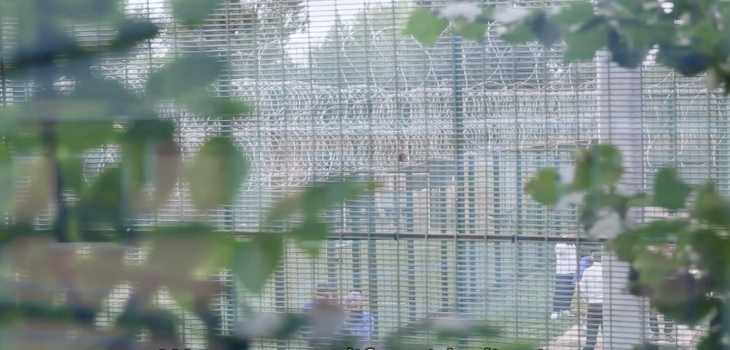Child detained for two months ‘by mistake’ at Mitie centre

[responsivevoice_button]
A child was locked up for 62 days “by mistake” at an immigration removal centre, a new report by the chief inspector of prisons released today reveals.
An inspection into the Campsfield centre in Oxfordshire, run by outsourcing giant Mitie, also found asylum seekers living in overcrowded and dirty accommodation, insufficient legal advice for detainees, and torture survivors held in violation of Home Office rules.
Despite these problems, Nick Hardwick, the chief inspector, said:
“Overall, this was a very positive inspection. Staff and managers at Campsfield House should be congratulated in dealing professionally and sensitively with detainees who were going through what, for many, was a difficult and unhappy time.”
The report found that three children were held at Campsfield between 2012 and 2013, in contravention of government policy. One of the children, a 16 year old, was assessed by social services as being an adult. After 62 days in detention, social workers realised they were a minor and ordered their release. The inspectors said that the child “was held by mistake and should never have been detained”. Mitie’s policy on safeguarding children was:
“up to date and comprehensive, but there was no named member of staff who took the lead on safeguarding children … Some staff had undertaken the Mitie safeguarding e-learning package but the centre could not provide us with exact figures. A member of staff was to attend training with Oxfordshire’s local safeguarding children board after our inspection.”
Mitie are also holding detainees in overcrowded cells according to the report. The inspectors said: “Too many detainees lived in cramped conditions, with four sharing accommodation designed for two.” The signs of overcrowding are apparent:
“the dining area was not big enough for the number of detainees using it and hygiene in the kitchen required improvement … The laundry was not big enough for the population. During our inspection two washing machines did not work and detainees said this was a regular occurrence.”
Ironically, given Mitie is best known as a cleaning company, the report recommended:
“Toilets and showers in all residential units should be deep cleaned … some toilets and showers were very dirty and needed maintenance … bed linen was in poor condition and we saw soiled pillows and mattresses.”
These problems may arise in part from the fact that Mitie is paying the detainees just £1 per hour to do these jobs. The report found 24 detainees worked in the dirty kitchen, and in total “Seventy-four job roles, totalling 1265 hours of paid work per week, were offered … Opportunities included cleaning, kitchen and laundry work”.
Asylum-seekers who have suffered from torture are not normally allowed to be detained by the Home Office. But at Campsfield, the screening process that is supposed to protect against this, known as Rule 35: “failed adequately to safeguard the most vulnerable detainees, including those who had been tortured.” The report found:
“In two separate cases, a doctor stated that a detainee might have been the victim of torture but caseworkers maintained they should remain in detention stating that this would not impact on the detainee’s health; the impact on their health was irrelevant as Home Office policy is not to detain torture survivors. In another case, a caseworker maintained that a person should remain in detention because he ‘did not mention being tortured during your screening interview ….’”
Healthcare at Campsfield is provided by The Practice, a private medical company. There was evidence of short-staffing: “only one member of staff was available at night which was not compliant with current healthcare guidelines”; and of staff cutting corners:
“nurses had labelled items supplied from stock inadequately, which could have posed a risk to patients. A nurse was observed giving a detainee a dose of ibuprofen without referring to his notes for contraindications, which was potentially unsafe.”
And none of the Mitie custody staff had been trained to use the defibrillator, a life-saving piece of equipment if detainees have heart attacks, which has happened in many other detention centres over the last few years.
The report also found legal support for detainees in Campsfield was insufficient: “Too many detainees who required an immigration lawyer did not have one.” The half-hour legal aid sessions were “oversubscribed”, and there was not enough advice about bail. Perhaps inevitably then, inspectors found “Some detainees were detained for unreasonable periods of time. Home Office caseworkers sometimes failed to act with reasonable diligence and expedition.” It took the Home Office over seven months before they even interviewed one detainee about his asylum claim. In another example, an undocumented Iranian man had been held for almost ten months, although the Home Office had no “established process at present” to obtain the paperwork needed to deport him to Tehran. The inspectors concluded: “There was little prospect of this case being resolved within a reasonable period and ongoing detention therefore appeared illegitimate.”
Against this catalogue of errors, it is therefore surprising that the chief inspector was able to conclude that the report was overall ‘very positive’. Worryingly, major incidents have been omitted from the document. There is no mention whatsoever of the fire at Campsfield in October 2013 that spread due to an absence of sprinklers and caused 180 people to be evacuated. Mass hunger-strikes by detainees, most recently in May 2014, just months before the inspection, are also absent. And the inspectors are careful not to blame Mitie, the company in charge, focusing instead on reforms needed at the national level by the Home Office.
Giving a centre a positive report even after overcrowding its cells, paying £1 per hour for important work, wrongly imprisoning children and torture survivors shows the low standards expected of the companies profiting from the detention of migrants.
The full report is available to download here (pdf)
Photo taken from the Standoff Films documentary ‘Campsfield House: An Immigration Removal Centre’.
